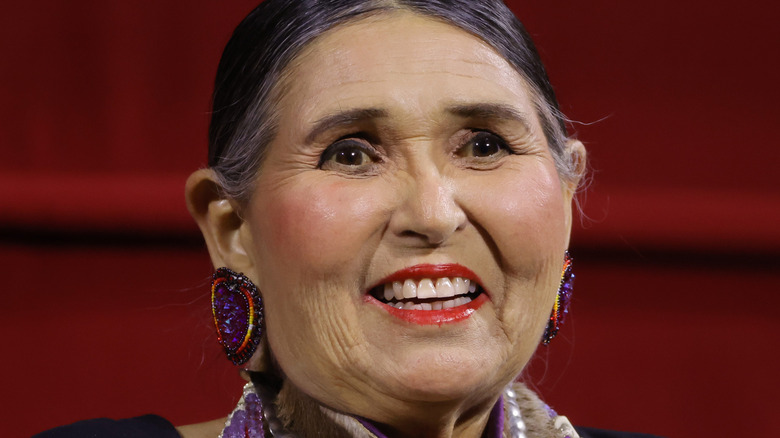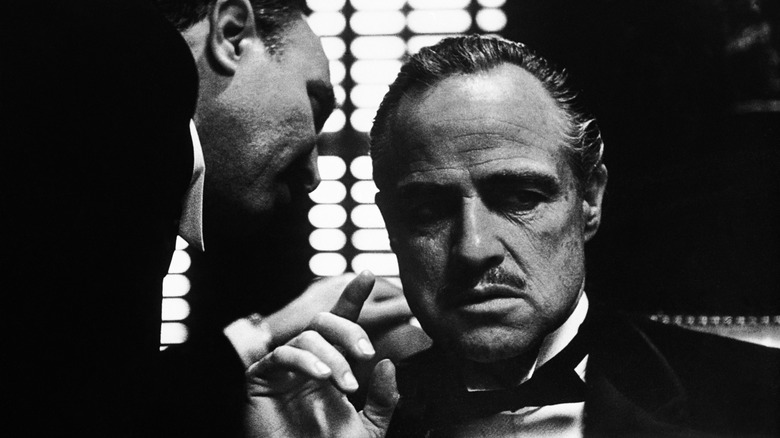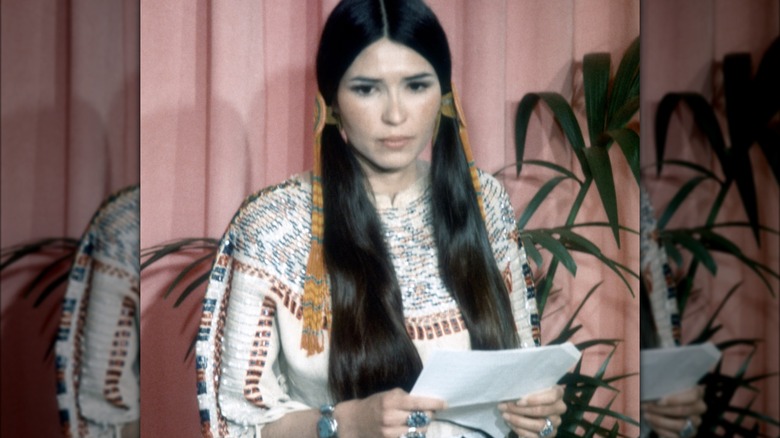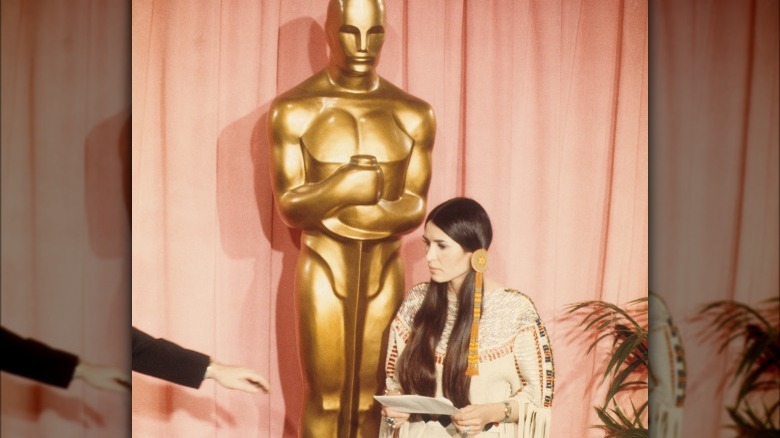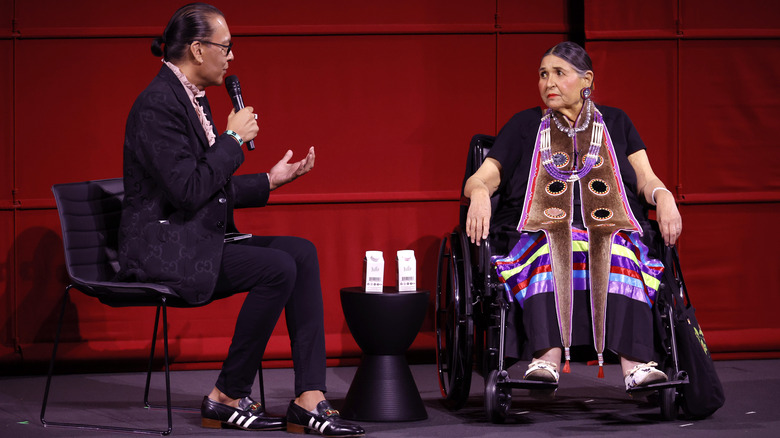The Academy Of Motion Picture Arts And Sciences Apologized To Sacheen Littlefeather - Here's Why
We may receive a commission on purchases made from links.
This Indigenous Peoples' Day, it's vital to elevate stories that have been systematically erased from the larger cultural narrative. In doing so, we acknowledge Indigenous contributions to activism, art, and culture, especially in the case of Native Americans, whom The Academy of Motion Picture Arts and Sciences recently referred to as "the original storytellers."
Sacheen Littlefeather, an Apache and Yaqui actress, made history in 1973 when she represented actor Marlon Brando at the Academy Awards. Per The New York Times, Brando asked the actress to refuse his Oscar for playing Vito Corleone in "The Godfather" in order to protest damaging stereotypes of Native Americans in film, television, and politics.
Littlefeather's demonstration occurred amidst activists' 1973 occupation at the site of the massacre at Wounded Knee, which took place in 1890 at the end of the American Indian Wars, per The Atlantic. The 1973 protests saw Oglala Lakota (Sioux) activists and representatives of the American Indian Movement (AIM) take control of the small town in South Dakota and face off against armed government agents over the course of 71 days.
The conflict had been experiencing a media blackout, but ultimately, coverage did improve thanks to Littlefeather's speech, and she also addressed Native representations that negate the realities of Indigenous peoples and their histories. However, the fallout from her speech would endanger her career as well as her safety, and the Academy of Motion Pictures did not acknowledge her bravery until nearly 50 years later.
She was representing a legendary actor
How did Sacheen Littlefeather's historic Oscars speech come about? The then 26-year-old actress had become friends with legendary director Francis Ford Coppola, who was a neighbor of Marlon Brando's, per The New York Times. Brando had been vocal about his support for Native Americans, and Littlefeather asked Coppola to give the actor a letter she had written. After Brando responded more than a year later, per Littlefeather's account, the two struck up a friendship.
Littlefeather told the Academy of their relationship, "It was just two people who had a lot in common, who spoke about Indians, politics, activism, culture of Indians, Wounded Knee, movies, films, sports mascots. Everything dealing on that level."
The night before the 45th Academy Awards ceremony, Brando asked Littlefeather to represent him if he won the Oscar. Brando — who had a tragic life story – felt moved to make a political statement by not attending the ceremony and giving a Native actress a platform to speak on the issues facing the larger Indigenous community.
However, when the actor gave Littlefeather a speech that was eight pages long, an Academy producer said that if she spoke for more than 60 seconds, she would be arrested, per Littlefeather's 2022 interview with The Academy. When Brando won the Oscar, Littlefeather took the stage, speech in hand, but ultimately spoke from her own perspective.
There was serious fallout from her speech
Sacheen Littlefeather's speech at the 1973 Oscars was the first time a Native American woman had appeared on-stage at the Academy Awards, and it was also the first major political statement issued in the event's history. She told the Academy in 2022, "This was the first time in television history that the Academy Awards was televised outside of the United States of America via satellite throughout the world. So, all of the world's media was watching." Her words also resulted in real-time action. "And, as a result, the people who were in the newspaper business and the television business outside of the United States descended upon Wounded Knee in South Dakota," she explained.
However, there was unrest in the audience and backstage that night. In the wings, actor John Wayne was reportedly physically restrained to stop him from storming the stage.
Per The Los Angeles Times, Marlon Brando himself later told talk-show host Dick Cavett about his discomfort surrounding Littlefeather's experience. "I was distressed that people should have booed and whistled and stomped, even though perhaps it was directed at myself. They should have at least had the courtesy to listen to her."
Littlefeather told the Academy about the award show's aftermath. "When I went back to Marlon's house, there was an incident with people shooting at me," Littlefeather shared. She also noted that audience members and people at the after party made racist comments and gestures, such as the "tomahawk chop."
She was blacklisted in Hollywood
After making history, Sacheen Littlefeather was all but blacklisted from Hollywood, and her acting career was effectively over. She told the Academy, "I couldn't get a job to save my life." However, Littlefeather remained dedicated to the cause of positive representations of Native peoples, and throughout the remainder of her life, served as a spokesperson and activist in her community.
But more than 50 years after Littlefeather's speech, The Academy of Arts and Sciences has finally acknowledged her contributions. The Academy's apology began, "As you stood on the Oscars stage in 1973 to not accept the Oscar on behalf of Marlon Brando, in recognition of the misrepresentation and mistreatment of Native American people by the film industry, you made a powerful statement that continues to remind us of the necessity of respect and the importance of human dignity."
The apology went on to address the ensuing struggles Littlefeather faced in her career, as well as media excoriation and threats to her personal safety. "The abuse you endured because of this statement was unwarranted and unjustified," the statement said. "The emotional burden you have lived through and the cost to your own career in our industry are irreparable. For too long the courage you showed has been unacknowledged. For this, we offer both our deepest apologies and our sincere admiration."
Littlefeather was originally contacted by producer Bird Runningwater, co-chair of the Academy's Indigenous Alliance, and she has since participated in the Academy's podcast, the Academy Oral History Projects, and An Evening with Sacheen Littlefeather.
The late activist has made a lasting impact
Speaking with Bird Runningwater at An Evening with Sacheen Littlefeather, the activist said, "I didn't represent myself," referencing her historic Oscars speech. "I was representing all Indigenous voices out there, all Indigenous people, because we had never been heard in that way before." She continued, "I had to pay the price of admission, and that was OK. Because those doors had to be open."
In her life, Littlefeather went on to become a health educator, work alongside Mother Theresa, and founded the American Indian AIDS Institute as well as the National American Indian Performing Arts Registry.
In a 2021 interview with The Guardian, Littlefeather revealed her devastating diagnosis of metastatic breast cancer. But, in approaching the end of her life, she told The Hollywood Reporter that she was pleased with the progress made in Hollywood for Native American artists, including Runningwater, actor Wes Studi, and "Reservation Dogs" creator Sterlin Harjo.
Sacheen's story has been made into a short documentary titled "Sacheen: Breaking the Silence," which was up for Oscar consideration in 2021 and is available for streaming. After her long-deserved apology, Littlefeather told the Academy, "It feels like the sacred circle is completing itself before I go in this life," referencing her terminal diagnosis. "It feels like a big cleanse, if you will, of mind, body, and spirit, and of heart. It feels that the truth will be known."
The Academy's apology was dated June 18, 2022, while An Evening with Sacheen Littlefeather occurred on September 17, 2022, just weeks before Littlefeather passed away on October 2.
